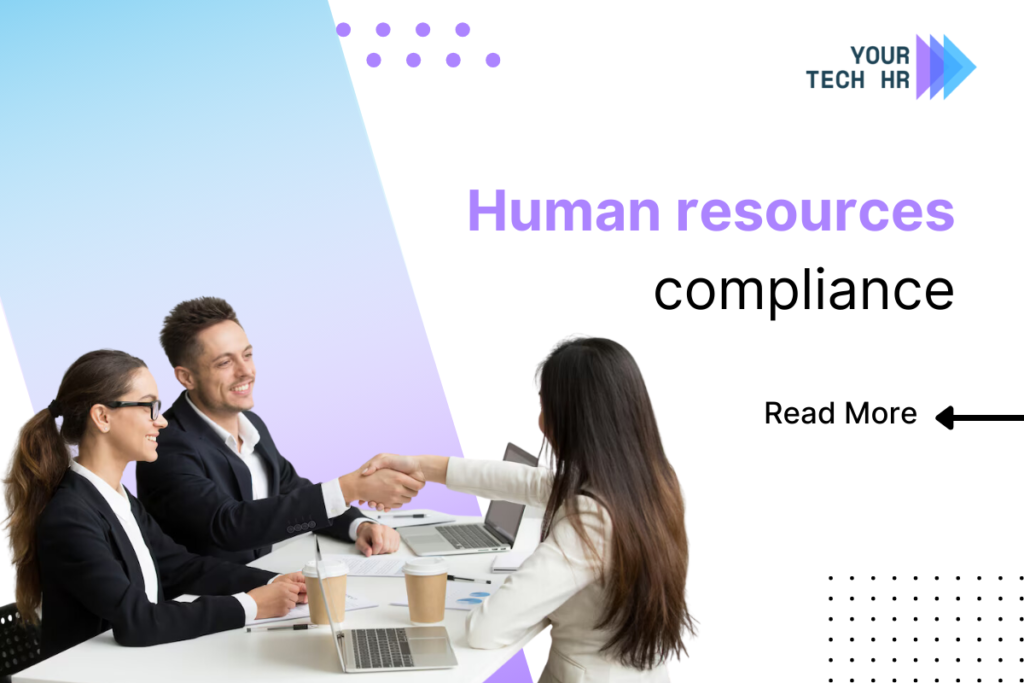Human Resources (HR) compliance is crucial for every organization. It ensures that companies follow laws and regulations, protecting both employees and the business. In today’s fast-changing work environment, staying up-to-date with HR compliance trends is more important than ever. This blog will help you understand the top trends in HR compliance and how they can impact your organization.
Understanding HR Compliance
HR compliance means following all the laws and regulations related to employment. This includes everything from hiring practices to employee data protection. HR compliance ensures that companies treat employees fairly, avoid legal problems, and create a safe work environment.
Trends in HR Compliance
1. Employee Data Privacy
Employee data privacy is becoming a top priority. With more personal information being collected and stored by companies, it’s important to protect this data from breaches and misuse.
- Why It Matters: Protecting employee data is not just about avoiding fines—it’s about building trust with your employees. If employees feel their data is safe, they are more likely to trust the organization.
- How to Stay Compliant: Implement strong data protection measures, like encryption and regular audits, to ensure that sensitive information is secure. Train employees on how to handle data properly to avoid accidental breaches.
2. Remote Work Compliance
The rise of remote work has brought new challenges for HR compliance. Companies now need to ensure that their remote employees are working in safe environments and that they comply with local labor laws.
- Why It Matters: Remote work is here to stay, and companies must adapt to ensure compliance with different laws in various locations. This includes everything from work hours to health and safety regulations.
- How to Stay Compliant: Create a clear remote work policy that outlines expectations and legal requirements. Make sure to regularly check in with remote employees to ensure they have the resources they need to work safely and efficiently.
3. Diversity, Equity, & Inclusion (DE&I)
Diversity, Equity, and Inclusion (DE&I) is becoming a central focus for many organizations. Companies are now more aware of the need to create a diverse and inclusive workplace that respects all employees, regardless of their background.
- Why It Matters: DE&I helps create a positive work environment where everyone feels valued and respected. It also helps companies attract a wider range of talent.
- How to Stay Compliant: Develop and implement DE&I policies that promote fairness and inclusion in the workplace. This includes providing regular training for employees and managers on how to foster an inclusive work environment.
4. Artificial Intelligence (AI) in HR
Artificial Intelligence (AI) is transforming the way HR departments operate. From recruitment to performance management, AI tools are helping companies streamline processes and make better decisions.
- Why It Matters: AI can help reduce bias in hiring and improve the accuracy of HR decisions. However, it’s important to ensure that AI tools are used ethically and comply with legal requirements.
- How to Stay Compliant: Choose AI tools that have been tested for fairness and transparency. Make sure your HR team understands how these tools work and how to use them in a way that complies with legal standards.
5. Workplace Harassment Prevention
Workplace harassment is a serious issue that can have legal and financial consequences for companies. Ensuring that your organization has strong policies and training in place to prevent harassment is a key part of HR compliance.
- Why It Matters: Preventing harassment is not just about avoiding lawsuits—it’s about creating a safe and respectful work environment for all employees.
- How to Stay Compliant: Regularly review and update your harassment policies. Provide ongoing training for employees and managers on how to recognize and prevent harassment in the workplace.
Current Trends in HR Compliance
1. Increased Focus on Mental Health
Mental health is becoming a significant part of HR compliance. Companies are now required to consider mental health in their policies and practices, ensuring that employees have access to the support they need.
- How to Address: Offer mental health resources and ensure that employees know how to access them. This could include Employee Assistance Programs (EAPs) and mental health days.
2. Global Compliance Standards
As companies expand globally, they must navigate a complex web of international HR laws and regulations. This includes everything from data protection laws to labor standards in different countries.
- How to Address: Work with HR compliance consulting services that specialize in global compliance. Regularly update your policies to reflect changes in international laws.
3. Use of Compliance Jobs Remote Working
With the rise of remote work, there is an increasing demand for compliance professionals who specialize in remote working environments. These professionals help ensure that companies comply with local and international labor laws while supporting remote teams.
- How to Address: Consider hiring remote compliance experts or working with HR compliance consulting services to ensure your remote work policies are up-to-date.
Challenges in HR Compliance
1. Keeping Up with Changing Laws
HR compliance is challenging because laws and regulations are constantly changing. Companies must stay informed and adjust their policies to remain compliant.
- Solution: Subscribe to HR compliance courses and legal updates to stay current. Regularly review your policies to ensure they align with the latest laws.
2. Managing Employee Data
As companies collect more employee data, managing and protecting this information becomes increasingly complex.
- Solution: Invest in HR compliance solutions that help manage and protect employee data. Ensure your HR team is trained in data privacy best practices.
3. Balancing Compliance with Company Culture
Ensuring compliance without disrupting company culture can be a delicate balance. It’s important to create policies that support compliance while also fostering a positive work environment.
- Solution: Involve employees in the development of compliance policies to ensure they align with company culture. Regularly review these policies to ensure they continue to support both compliance and a positive work environment.
Best Practices for HR Compliance
1. Regular Training and Education
Providing regular training on HR compliance is essential. This helps employees and managers understand the importance of compliance and how to apply it in their daily work.
- Tip: Offer ongoing HR compliance courses that cover the latest trends and regulations. Make training accessible and engaging to ensure all employees participate.
2. Implement a Compliance Checklist
A compliance checklist is a useful tool for ensuring that all HR processes are up-to-date and in line with current laws.
- Tip: Develop an HR compliance checklist that covers all key areas, including data privacy, remote work, and DE&I. Regularly review and update the checklist to reflect any changes in regulations.
3. Work with HR Compliance Consulting Services
If managing HR compliance feels overwhelming, consider working with an HR compliance consulting service. These experts can help ensure your policies are compliant and tailored to your organization’s needs.
- Tip: Choose a consulting service that specializes in the areas most relevant to your company, such as remote work or global compliance.
Conclusion
HR compliance is a vital part of running a successful organization. By staying informed about the latest trends and implementing best practices, you can ensure that your company remains compliant and creates a positive work environment for all employees. Whether it’s protecting employee data, managing remote work, or fostering diversity and inclusion, staying ahead of HR compliance trends will help your company thrive.


